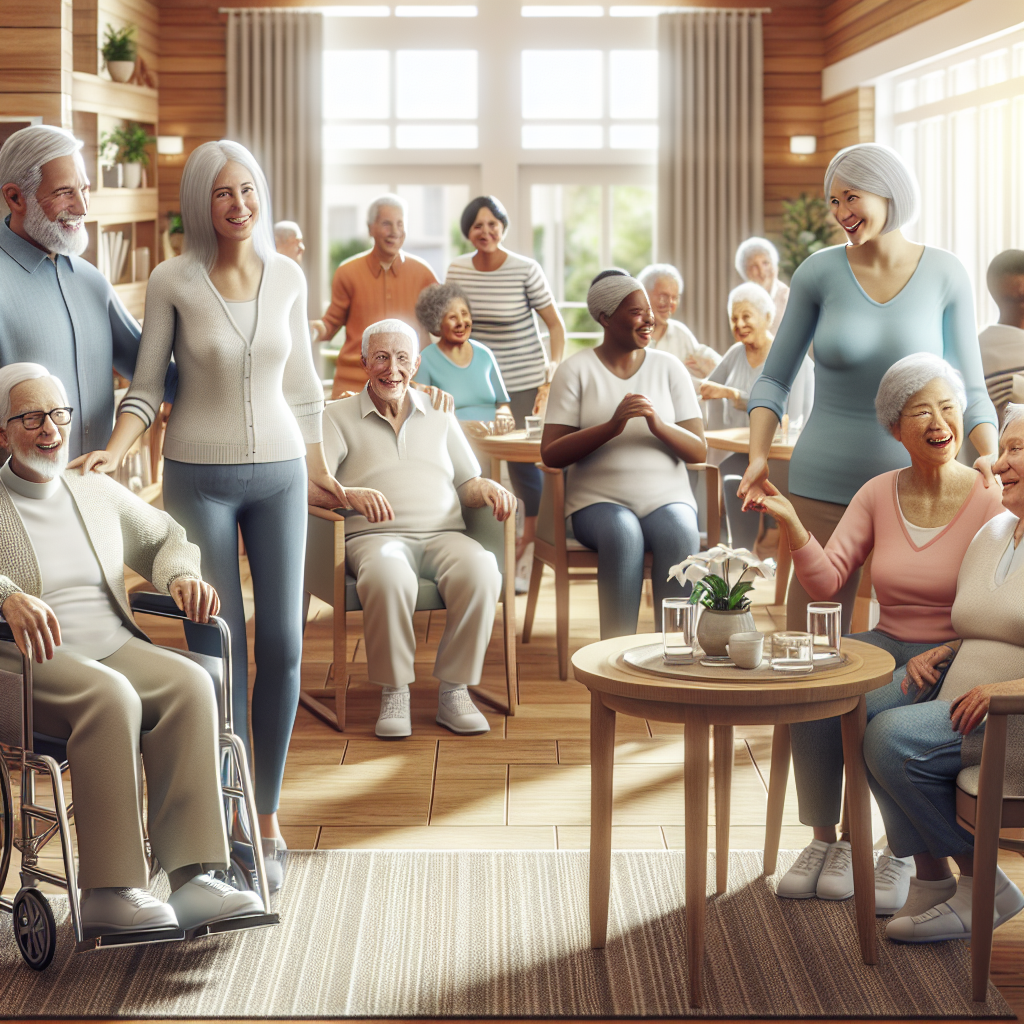Modern Elder Care Solutions for Today’s Families
Introduction
Welcome to the world of modern elder care solutions, where the golden years of our loved ones can be filled with dignity, joy, and the right support. If you’re an adult child navigating the sometimes murky waters of caring for aging parents, you’re not alone. With a plethora of senior care services available today, it can feel like trying to find a needle in a haystack if that needle were also wearing bifocals and asking for a snack!
The reality is that as our parents age, their needs evolve. From in-home senior care to assisted living facilities, there are numerous options to ensure they receive the best possible support tailored to their unique circumstances. It’s not just about keeping them safe; it’s about enhancing their quality of life while respecting their independence.
In this blog post, we’ll dive into various elder care solutions designed to meet diverse needs from memory care solutions for those facing cognitive challenges to practical strategies for long-term care planning. We’ll also explore how technology is revolutionizing the way we approach elderly assistance programs and what role family dynamics play in these decisions.
So grab your favorite beverage (coffee or tea no judgment here), settle in, and let’s embark on this enlightening journey together. By the end, you’ll be equipped with insights and options that can transform your approach to caring for your loved ones.
Understanding Elder Care Solutions
When it comes to elder care solutions, think of it as a buffet of options where each dish is tailored to meet the unique needs of our beloved seniors. So, what exactly does this buffet include? Let’s dig in!
- Definition of elder care solutions: These are a variety of services designed to support the aging population, ensuring they receive the right level of care and assistance as they navigate their golden years.
- Importance of tailored care for seniors: Just like a well-fitted suit, elder care solutions need to be customized. No two seniors are alike, and their needs can vary widely based on health status, personal preferences, and living situations.
Imagine your aging parent wanting to hold onto their independence while still needing a little help with daily tasks. This is where in-home senior care steps in like a superhero sidekick providing just the right amount of support without taking away their autonomy.
Did you know? Research shows that seniors who receive personalized care are happier and healthier. Tailored elder support services can significantly improve their quality of life!
The landscape of senior care services is evolving rapidly, thanks to advancements in technology and an ever-growing understanding of geriatric needs. From home health care for elderly individuals to assisted living facilities that feel more like luxury hotels than nursing homes, there’s something for everyone.
In addition to traditional options, there are also innovative programs like adult daycare centers that offer social engagement and activities during the day while providing family caregivers with much-needed respite. It’s all about creating a holistic approach that respects dignity and promotes well-being.
Types of Senior Care Services Available
When it comes to elder care solutions, the options are as varied as your favorite ice cream flavors and trust me, you want to explore them all! Here’s a breakdown of the most common types of senior care services available today, each catering to different needs and preferences.
-
In-home Senior Care Options
Imagine having a personal assistant who not only helps with daily tasks but also provides companionship. That’s what in-home senior care is all about! Services can range from basic personal care for seniors, like bathing and grooming, to more specialized home health care for elderly individuals with specific medical needs. It’s like having a trusted friend right at home!
-
Assisted Living Facilities Overview
If your loved one needs a bit more help but still wants to maintain their independence, assisted living facilities are a great option. These communities offer personal care services along with social activities, making it easier for seniors to connect with others while receiving the support they need. Think of it as a retirement community where they can truly thrive!
-
Adult Daycare Programs and Their Benefits
Adult daycare programs are perfect for families who need daytime support while juggling work and other responsibilities. These programs provide a safe environment where seniors can engage in activities, enjoy meals, and socialize with peers. It’s like summer camp for seniors minus the bug spray!
-
Nursing Home Alternatives: What to Consider
Nursing homes often get a bad rap, but there are plenty of nursing home alternatives that might better suit your family’s needs. Options like skilled nursing for elders or transitional senior care services can provide medical support without the institutional feel of traditional nursing homes. It’s all about finding that sweet spot between care and comfort.
Key Takeaway: The right elder care solutions depend on individual needs, preferences, and family dynamics. Exploring various options ensures that your loved one receives the best possible support while maintaining their dignity and independence.
Aging in Place Solutions
As our loved ones age, the question often arises: how can we ensure they continue to live comfortably and safely in their own homes? Enter aging in place solutions a game changer in the world of elder care solutions. These options allow seniors to maintain their independence while receiving the support they need.
Home Modifications for Safety and Accessibility
First things first, let’s talk about home sweet home. Making modifications can transform a regular house into a senior-friendly haven. Think about:
- Grab bars: These handy helpers can be installed in bathrooms and hallways to prevent falls.
- Ramps: A smooth transition from outside to inside is essential, especially for those using mobility aids.
- Wider doorways: This ensures that wheelchairs or walkers can easily navigate through the house.
Technology Solutions for Remote Monitoring and Support
The tech-savvy age has blessed us with gadgets that make aging at home safer than ever! Consider these innovative solutions:
- Remote monitoring systems: These allow family members to keep an eye on their loved ones’ health metrics from afar.
- Smart home devices: Voice-activated assistants can help seniors control lights, thermostats, and even call for help without moving around too much.
- Sensors: Motion sensors can alert caregivers if something seems off like if a senior hasn’t gotten out of bed by a certain time.
Mobility Aids and Elderly Assistance Programs
No one wants to feel like they’re losing their independence, right? That’s where mobility aids come into play. Options include:
- Walkers and rollators: Offering stability while allowing seniors to stay active.
- Scooters: Perfect for those who need a little extra help getting around town or just down the street!
- Elderly assistance programs: Many communities offer services that provide transportation or companionship think of it as having a buddy system!
Did you know? Studies show that seniors who remain in their own homes report higher levels of happiness and lower levels of depression compared to those in assisted living facilities. It’s all about keeping that sense of belonging!
Aging in place solutions are not just about keeping our elders safe; they are about preserving dignity and independence. So whether you’re considering home modifications or exploring technology options, remember that these choices can significantly impact your loved one’s quality of life.
Geriatric Care Management and Support Services
When it comes to elder care solutions, navigating the maze of options can feel like trying to find a needle in a haystack. Enter geriatric care management a superhero in disguise, ready to save the day for families juggling the complexities of senior care.
The Role of Geriatric Care Managers in Elder Support Services
Geriatric care managers (GCMs) are like your personal GPS for elder care. They help families chart a course through the often overwhelming landscape of senior care services. From assessing needs to coordinating medical appointments, these professionals ensure that your loved one receives tailored support that fits their unique situation.
Did you know? GCMs can also assist with long-term care planning, making sure that all bases are covered from financial considerations to healthcare options.
Dementia Care Options and Memory Care Solutions
If your loved one is facing memory challenges, finding the right support is crucial. Memory care solutions are specifically designed environments that cater to those with dementia or cognitive impairments. These facilities provide structured activities, safety measures, and specialized staff trained in managing symptoms, ensuring a secure and engaging atmosphere for seniors.
Respite Care Services for Family Caregivers
Caring for an aging loved one can be both rewarding and exhausting. That’s where respite care services come into play offering much-needed breaks for family caregivers. Whether it’s a few hours or several days, these services allow caregivers to recharge while ensuring their loved ones continue receiving quality support.
- Types of respite care include:
- In-home assistance: A caregiver comes to your home to provide support.
- Adult daycare programs: A safe place where seniors can socialize and engage in activities.
- Short-term stays at assisted living facilities: Temporary accommodations that offer full services.
The beauty of geriatric care management lies in its holistic approach addressing not just physical needs but emotional and social aspects too. It’s about creating a comprehensive plan that enhances quality of life while alleviating stress for families.
Planning for Long-Term Care Needs
When it comes to long-term care planning, thinking ahead is not just smart it’s essential. Just like you wouldn’t embark on a road trip without a map (or at least a GPS), navigating the complex world of elder care solutions requires some serious foresight.
First up, let’s talk about the elephant in the room: financial planning for eldercare costs. Spoiler alert: it can be pricey. A recent study found that the average annual cost for nursing home care can exceed 0,000! So, it’s crucial to get your financial ducks in a row. Consider factors such as:
- Insurance Coverage: What does Medicare cover? What about long-term care insurance?
- Savings and Assets: How much have you set aside for potential elder care expenses?
- Government Assistance: Are you aware of any elderly assistance programs that could help?
Next on our checklist: understanding your options. The landscape of senior healthcare options is vast and varied, from in-home senior care to assisted living facilities and everything in between. Here are some key considerations:
- In-Home Care: This allows seniors to age in place while receiving personal care tailored to their needs.
- Nursing Home Alternatives: Explore options like senior living communities or adult daycare programs that offer social interaction and support.
- Dementia Care Options: If memory issues are a concern, look into specialized memory care solutions that provide a safe environment.
Tip: Always ask about transitional senior care services if you’re unsure about moving your loved one into a facility right away. These services can help ease the transition while ensuring quality support.
The importance of long-term care planning strategies cannot be overstated. Think of it as building a safety net for your family and loved ones. Here are some strategies to consider:
- Create an Advance Directive: This legal document outlines your loved one’s wishes regarding medical treatment and end-of-life decisions.
- Regularly Review Plans: Life changes, and so do needs make sure you revisit your long-term care plans annually.
- Simplify Communication: Keep family members in the loop about decisions and changes in plans; this reduces stress when decisions need to be made quickly.
The journey of planning for long-term care needs may seem daunting, but remember: you’re not alone! Utilize resources like eldercare consultation services or caregiver resources for seniors to guide you through this process. After all, proper planning today can lead to peace of mind tomorrow!
The Role of Family in Elder Care Decisions
When it comes to elder care solutions, family dynamics play a pivotal role. Think of it as a family road trip: everyone has their own ideas on the best route, but ultimately, you want to reach the destination together. The journey of caregiving can be just as complex and emotional.
Family Support for Elder Caregiving Dynamics
Family members often become the first line of support when it comes to making elder care decisions. This support can take many forms:
- Emotional Support: Offering a listening ear or shoulder to cry on can ease the stress that comes with caregiving.
- Decision-Making: Family discussions can help clarify what type of senior care services are most suitable.
- Physical Assistance: Whether it’s helping with daily tasks or coordinating home modifications for safety, family involvement is crucial.
The Emotional Aspects of Caregiving Choices
The emotional landscape of caregiving is like a roller coaster ride there are highs and lows, and sometimes you just want to scream. Family members often grapple with feelings of guilt, anxiety, and even resentment as they navigate their loved one’s aging process. It’s important to acknowledge these feelings:
- Guilt: Many caregivers feel guilty about not being able to do enough. This is where open communication within the family can help ease those burdens.
- Anxiety: Worrying about the well-being of an elderly parent is common. Utilizing professional resources like geriatric care management can alleviate some of this stress.
- Resentment: Sometimes, caregivers may feel overwhelmed by their responsibilities. Establishing boundaries and sharing tasks among family members can mitigate these feelings.
Did you know? Studies show that families who work together in caregiving roles report higher satisfaction levels and lower stress compared to those who go it alone!
Navigating Difficult Conversations
Difficult conversations about elder care options like transitioning from independent living to assisted living facilities can be daunting. Here are some strategies for making these discussions less awkward and more productive:
- Create a Safe Space: Choose a comfortable setting where everyone feels at ease.
- Be Honest but Compassionate: Share your concerns openly while being sensitive to your loved one’s feelings.
- Acknowledge Their Wishes: Respecting the preferences of your elderly family member is crucial in any decision-making process.
Conclusion
- Recap of modern elder care solutions available
- Encouragement to explore options that best fit family needs
- Invitation to seek professional guidance from compassionate caregivers




